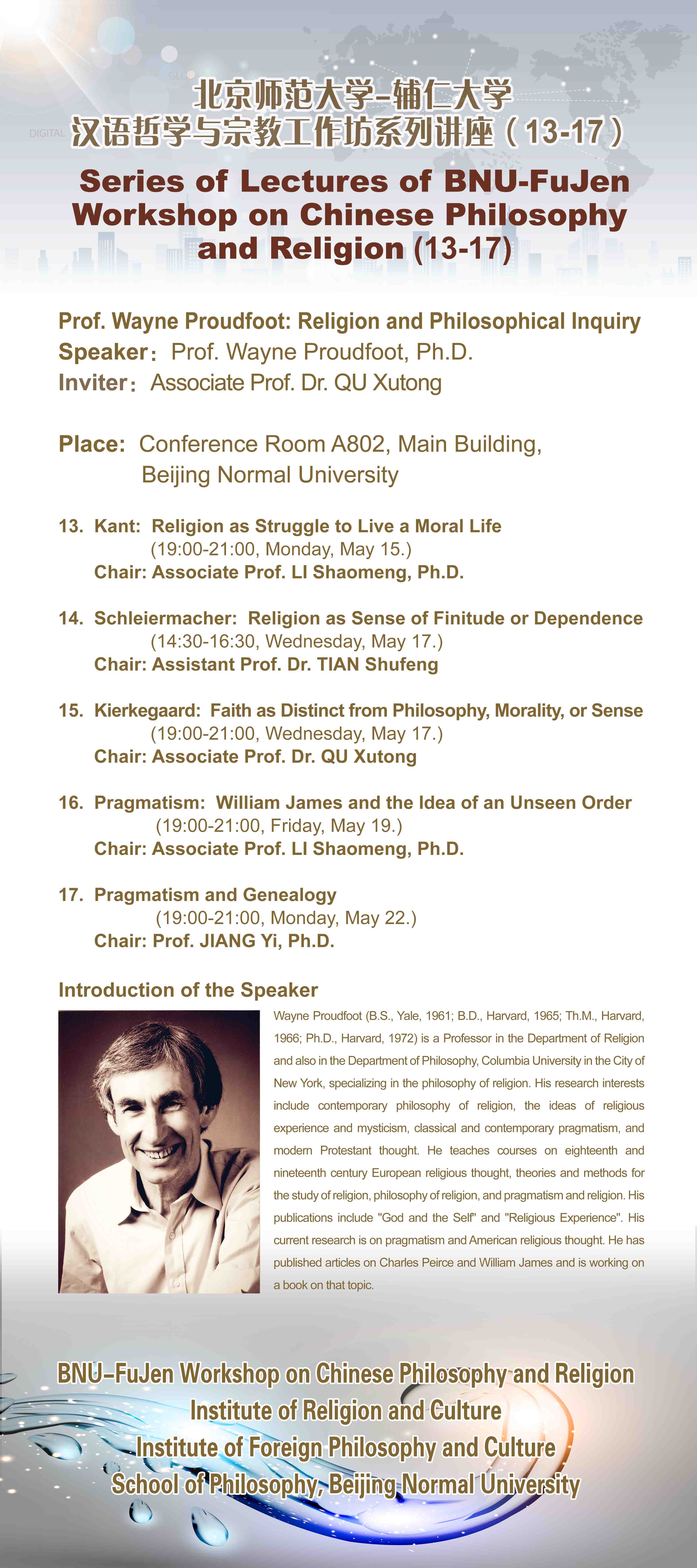本站不再支持您的浏览器,360、sogou等浏览器请切换到极速模式,或升级您的浏览器到 更高版本!以获得更好的观看效果。关闭

首页
当前位置: 首页» 学术活动

学术活动
Prof. Wayne Proudfoot: Religion and Philosophical Inquiry
Series of Lectures of BNU-FuJen Workshop on Chinese Philosophy and Religion (13-17)

Speaker:Prof. Wayne Proudfoot, Ph.D.
Invitor:Associate Prof. Dr. QU Xutong
Place: Conference Room A802, Main Building, Beijing Normal University
13. Kant: Religion as Struggle to Live a Moral Life (19:00-21:00, Monday, May 15.)
Chair: Prof. LI Shaomeng, Ph.D.
14. Schleiermacher: Religion as Sense of Finitude or Dependence (14:30-16:30, Wednesday, May 17.)
Chair: Assistant Prof. Dr. TIAN Shufeng
15. Kierkegaard: Faith as Distinct from Philosophy, Morality, or Sense (19:00-21:00, Wednesday, May 17.)
Chair: Associate Prof. Dr. QU Xutong
16. Pragmatism: William James and the Idea of an Unseen Order (19:00-21:00, Friday, May 19.)
Chair: Prof. LI Shaomeng, Ph.D.
17. Pragmatism and Genealogy (19:00-21:00, Monday, May 22.)
Chair: Prof. JIANG Yi, Ph.D.
Introduction of the Speaker
Wayne Proudfoot (B.S., Yale, 1961; B.D., Harvard, 1965; Th.M., Harvard, 1966; Ph.D., Harvard, 1972) is a Professor in the Department of Religion and also in the Department of Philosophy, Columbia University in the City of New York, specializing in the philosophy of religion. His research interests include contemporary philosophy of religion, the ideas of religious experience and mysticism, classical and contemporary pragmatism, and modern Protestant thought. He teaches courses on eighteenth and nineteenth century European religious thought, theories and methods for the study of religion, philosophy of religion, and pragmatism and religion. His publications include "God and the Self" and "Religious Experience". His current research is on pragmatism and American religious thought. He has published articles on Charles Peirce and William James and is working on a book on that topic.
BNU-FuJen Workshop on Chinese Philosophy and Religion
Institute of Religion and Culture
Institute of Foreign Philosophy and Culture
School of Philosophy, Beijing Normal University
Religion and Philosophical Inquiry
(Prof. Wayne Prounfoot, Columbia University in the City of New York)
An examination of different approaches to philosophy of religion and their relevance for contemporary thought.
I. Kant: Religion as Struggle to Live a Moral Life
For Immanuel Kant (1724-1804), religion is not metaphysics, but practical reason, reflection on the moral life. Morality doesn’t require religion, but it leads inescapably to religion. Kant shows in detail how Christian doctrine and practice can be reinterpreted as representations of the moral life, which he regards as a life of conflict. He revises his concept of free will in order to account for insights he finds in the idea of sin and he understands the Christian drama of sin and redemption as a representation of the struggle to lead a moral life. The ideas of a Son of God and a Kingdom of God are used by Kant to examine individual and social aspects of that life. Critics of Kant differ on whether his work is an affirmation or a reduction of religion.
II. Schleiermacher: Religion as Sense of Finitude or Dependence
Friedrich Schleiermacher (1768-1834) was an early German Romantic, a philosopher of hermeneutics, and a prominent Protestant theologian. Schleiermacher regards religion as neither metaphysics nor morals, but a sense of finitude or dependence. It is closer to feeling than to belief or action and is formed by cultivation of and reflection on imagination. He tells his artistic and poetic friends who despise religion that what they are doing in their art is the same as religion. To identify religion with metaphysics or morality is too egocentric, regarding persons as the center of the universe. Religion is a sense of the infinite, of the dependence of all on the whole, or on God.
III. Kierkegaard: Faith as Distinct from Philosophy, Morality, or Sense
For Søren Kierkegaard (1813-1855), God is radically other and faith cannot be reduced to reason, to morals, or to feeling or religious experience. Kierkegaard examines the implications of this otherness for faith, for what it means to be a Christian, and for what it means to be a self. He is a religious thinker who draws on and also contributes to the philosophical debates of his time, especially those of post-Kantian idealism. I’ll examine Kierkegaard’s attempts in his Philosophical Fragments to convey the otherness of faith and God by redescribing religious concepts as something other than philosophy. We’ll also look at how he analyzes different forms of anxiety and their relation to the concept of sin in The Sickness Unto Death.
IV. Pragmatism: William James and the Idea of an Unseen Order
The chief topic of American pragmatism is inquiry. What is genuine inquiry and how is it to be pursued? Charles Peirce, the founder of pragmatism, took science to exemplify real inquiry in a way much modern philosophy did not. He criticized claims for immediate access to truth by both empiricists and rationalists and set out criteria for clarifying concepts and resolving problems. Peirce later offered what he took to be a neglected argument for the reality of God, but it was William James who addressed this question throughout his work.
James took the question of God, and of religion more broadly, to be one of an unseen order that is congruous with the higher parts of human nature. I’ll show how James’s earlier work and his essay on “The Will to Believe” were a response to Peirce on inquiry, and how James developed it in his Varieties of Religious Experience and in Pragmatism.
V. Pragmatism and Genealogy
American pragmatism and continental philosophy since Immanuel Kant have a lot in common and much to offer one another. Richard Rorty may have been provocative in his statement that James and Nietzsche were saying the same thing at about the same time, but pragmatic inquiry is non-foundationalist and fallibilist without entailing relativism. I will look again at James’s Varieties and his lectures on Pragmatism. The pragmatic emphasis on genuine inquiry and the critical reflection on self and society in German idealism can benefit each other.
Peirce, James, and John Dewey reflected deeply on the social self and on forms of self-deception, but they could gain by careful attention to Friedrich Nietzsche’s genealogical method and his critical historical and social examination of Christian concepts and practices.
Kant and James make hope for a kingdom of God or an unseen ideal order central to their philosophical analyses of religion. Nietzsche and the contemporary philosopher Bernard Williams raise conceptual and historical questions about the idea of such an order, questions already voiced by James and Dewey about Hegel. I will suggest ways in which each of these provides valuable resources for a contemporary critical philosophy of religion.
北京师范大学哲学学院版权所有 Copyright © 2020 . All Rights Reserved






 电话:010-58802001
电话:010-58802001 传真:010-58802001
传真:010-58802001  E-mail:philoffice@bnu.edu.cn
E-mail:philoffice@bnu.edu.cn 地址:北京市海淀区新外大街19号北师大前主楼8层
地址:北京市海淀区新外大街19号北师大前主楼8层

